Posts Tagged ‘Memphis’
A New Name
“The nations shall see your righteousness, and all the kings your glory, and you shall be called by a new name that the mouth of the Lord will give.” Isaiah 62:2
As we enter Volunteer Appreciation Week, we are sharing inspiring stories of relationships between World Relief Memphis volunteers and our refugee and immigrant community. We’re confident you’ll agree with us, our volunteers are #LoveInAction!
When refugees first arrive at the airport, it is often after a long travel journey of several flights and multiple days. This would be enough to leave the average person weary. But for refugees, this is really the end of a much longer journey, that usually includes fleeing home at the point of death, waiting for years in an underfunded, overcrowded refugee camp, and then spending a minimum of eighteen months applying for resettlement to a Western nation like the United States. Bien Fait, one of our former clients at World Relief Memphis, remembers this feeling: “Our flight was two days, we were very tired, you know flying for two days, it was a very, very big issue, because we have taken five flights. All the people, my children, were tired. Myself, I was tired. My wife, was very tired. But when we reach the airport of Memphis, we say, ‘Thank you, God.’”
Finally arriving to the airport in their new city marks the end of long, arduous journey for refugee families, but the beginning of a new one to build a life in America. And that journey requires the help and commitment of people like Melissa Peeler.
Bien Fait remembers when he met Melissa for the first time: “We met with Melissa Peeler and Michael on August 24, 2016. She came there [the airport], she received us, she was introducing herself to us. She say, ‘I am Melissa Peeler, I will be your volunteer, to show you everything in America, until you will know about America. And I will never give up, I will be with you everyday, everytime. If you have some questions, if you need some help, call me.’” He also remembers being struck by such a strong statement from someone who he didn’t even know, telling us, “It was the first time to make friends with a white man, to know American people. When she was coming and saying, ‘I will be your volunteer, your friend,’ I was scared, thinking, ‘Why will this white man be my best friend, my volunteer? What is going on?’”
Melissa remembers that day in the airport, too, and how she felt meeting Bien Fait for the first time: “You know, I honestly do not remember saying those exact words to Bien Fait that night, but I absolutely remember thinking that to myself before I committed to being on a good neighbor team and ever knew his name. I knew this was going to be a pretty big ‘volunteer thing’ and I took it seriously…I think I was so overwhelmed seeing them walk off the plane so late that very first night, and was just overcome with the raw emotion of their circumstance and how young and unsure Josephine and Bien Fait and the kids were – and just wanting to say something reassuring to Bien Fait. My heart leaps at the thought that he remembers that I said something that translated to, ‘I was committed to him and his family’ that night.”
Melissa’s promise was not in vain. She taught Bien Fait and his family many things. He humorously recalled the first time that Melissa showed him how to use a slow cooker: “She said, ‘Because you are in America, you should learn how to cook American food!’ She came with a pot, that had power for cooking, and she put all the stuff in this pot, and she said, ‘You have to wait one hour and twenty minutes, and then the food will be ready and you can eat it!’ We said, ‘What?! In Africa, we don’t cook like this! In Africa, we cook on the fire, and you put the pot over the fire, we need to see that something is boiling. How do you cook like this?’ and she said, ‘This is a good way to cook in America! People will leave the pot, and then go to church, and when they come back, they find that the food is already cooked, and eat it.’ I said, ‘Okay!’ She showed us, and we tried to get experience to cook this food.”
Melissa remembers those first few weeks being marked by difficulty: “In the very beginning, we were very much a needed helper – a driver, an appointment maker and taker, a school registrar and uniform finder, for what seemed like more than a few pretty intense weeks…but the more time we spent with each other, the more comfortable we got with each other and things naturally grew into a genuine fondness for each other.” Eventually, Bien Fait’s family was celebrating holidays with the Peelers. “Melissa’s was the first American home to visit. She invited us there. We went there with my whole family. The first day was for Thanksgiving Day. She said, ‘Please, I need all of you to come to my house! Thanksgiving Day we have to share together!’ So we went there, she provided some very, very, very sweet food, very good food, which we shared together with Michael and the children. After that, she said, ‘If anyone has something he wants to tell, because it is Thanksgiving Day, we have to say something, to say thank you to God, for what He did for you.’ It was our first time [to celebrate Thanksgiving]; in Africa we didn’t know about Thanksgiving…This was the first time, we found this in America. It’s good, it’s good!”
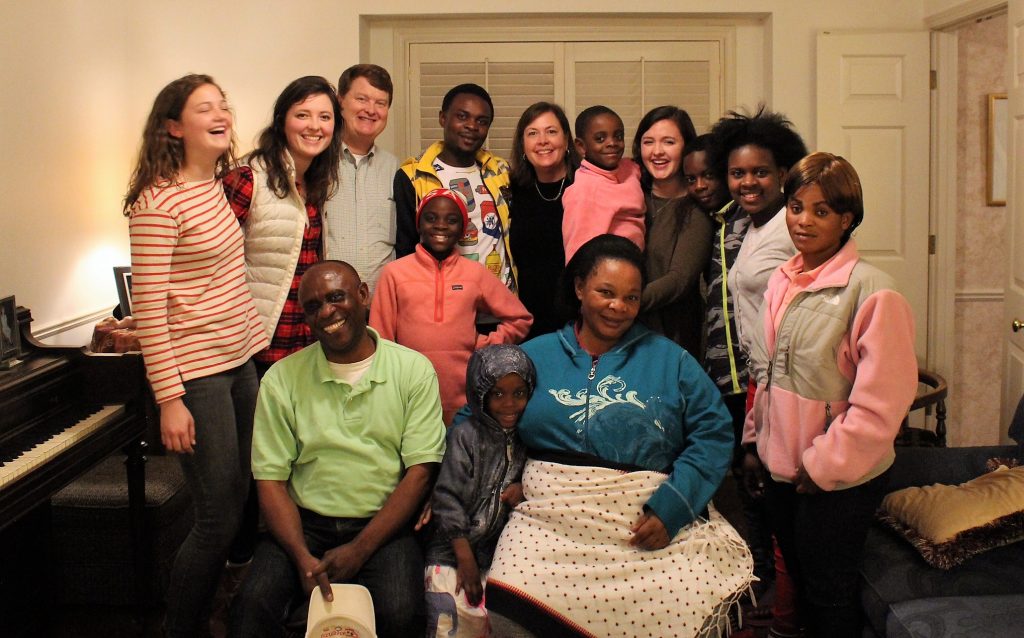
Bien Fait’s family has learned much about American culture from Melissa, but the Peelers have also learned a lot. “There are more small and medium things than I could ever say, but two of the most important things I’ve learned from the Mfaume’s is Faithfulness and Resilience. If you had asked me two years ago if I really understood what those words meant and if I had those qualities I would have honestly told you I did! I felt very faithful and comfortable in my faith walk and had overcome enough difficulties at the time to say I had built up quite a resiliency. MY WORD…it’s honestly laughable as I say that now, knowing the depths of the Faithfulness and Resiliency the Mfaume’s have. The devout trust and faithfulness the Mfaume’s have in God and his control in their lives is inspiring. I mean like big “I” Inspirational. They are grateful for every little blessing in their lives and talk about that openly and intentionally. They honestly put and continue to put their future in God’s hands daily. The patriarch of the family, Patient, had endured a pretty gruesome war injury and lost an eye that caused him terrible headaches and shooting pains down his neck. I never knew how much it hurt him until I accompanied him to the surgery consultation about repairing it. With the help of a translator, I learned the story of the ambush and fleeing with his young family and all the difficulties and pain the eye injury had caused and continued to cause him. But I never knew Patient without a smile on his face; he was the gentlest husband and father and walked around enduring this horrific physical pain without whining about it or even mentioning it for six months. The day of his surgery, I realized that Patient didn’t really understand how unlikely it was that any of the things one the waivers he signed (saying all the possible complications that could result, including death) might actually happen. Just as he was being rolled back to surgery he asked if he could take just a moment and pray! It was a long and beautiful prayer we had translated. He asked for blessings on all the doctors and nurses in the hospital, and he thanked everyone there and prayed for me and his family, and that God’s will be done with his life–as in, if he didn’t make it through the surgery, that I would keep helping his family and that God would take care of them. It was so incredibly moving! There was not a dry eye in pre-op that day at Regional One, I can tell you for sure. I promise it was the dearest prayer I have ever heard in my life! That’s faithfulness and resilience all rolled into one story and that’s one example of hundreds I’ve witnessed with refugees.”
Volunteers are crucial to the work that World Relief does. Bien Fait reflected on how differently things might have turned out without Melissa: “My life was very difficult without Melissa. When my wife was pregnant, she did a lot for us. Each appointment, she came and took my wife to these appointments. I work, so she was by herself here. If she had a problem, who was she going to call? I would call Melissa, she would come quickly and take care of her. Without Melissa, my life would be very difficult in America.”
Bien Fait was so moved by his relationship with Melissa and her family that he decided to name his newborn daughter Melissa, in honor of his first American friend. He told us, “Because of the mercy she showed to my family, I say, ‘I have to give your name to my little baby. When they went to the hospital for the ultrasound, they said she would bear a baby girl. The same day, I said her name would be Melissa. To show to her how much we love her. How much we say thank you for the things she has done for us. Some people in my family, they ask, ‘Why did you call your daughter Melissa? What does it mean?’ I would say, ‘I did this because a woman with this name did many things for me when I was new to America. It was a white woman who did everything for me. She helped me with everything. For keeping this name in my mind, I will name my little baby Melissa.’ They say, ‘Okay.’ Because they need to know the meaning, and where this name came from. It is not a family name. It is a new name.”
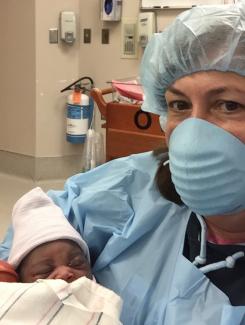
Melissa remembers how she felt when Bien Fait told her of his decision. “I could not believe it, and I immediately burst out into tears and said it was just too much! I have to say, it’s the greatest, sweetest honor I’ve ever received in my life. My three daughters are completely jealous and think that I love Baby Melissa the most now. I have to say she is really beautiful and the happiest little baby you’ve ever been around!”
Melissa and Bien Fait’s story is not necessarily typical, but it is a testament to the life-changing possibilities that emerge when people are willing to get out of their comfort zone and love someone who is very different than themselves. We asked Melissa and Bien Fait what they might say to someone who is unsure about refugees in America.
Bief Fait said, “American people have to leave this idea [being fearful of refugees]. Because, if you need to live better in a new country, you have to meet with the people who live in this country. Because those people, they will teach you how they live in their country. If they leave you, you will be everyday afraid of the rules, afraid of the new laws, but we meet with American people, and they need to be our friends. Because they know how to teach people about culture, and rules, and the laws, and when they teach you, you will be able to live without being afraid of anything. They have to come to help the African families, because we need them. We need to be with them. If they leave us, they do wrong. If the people say, ‘We cannot meet with an African family,’ we have to pray for them. Because that is not Christian. When a Christian sees someone who needs help, he has to help, without seeing the color, without seeing where this person is coming from, because the Bible says we have to help each one, without thinking about the race or the color.”
Melissa responded as well, saying, “First and foremost, STAY INFORMED and understand the truth about the refugee crisis in the world, and arm yourself with actual facts to proactively share with others or if you hear or read misinformation! Get on e-mail lists and advocacy texts, and follow refugee agencies on social media to keep up with current events and know what and who to PRAY for. Go to a volunteer training at World Relief Memphis- even if you don’t end up committing to a Good Neighbor team, there are lots of ways to donate money or goods or services that are greatly needed, as well. SHARE STORIES with others about what you know about refugees. It is almost impossible for even the most hardened folks to hate a maimed grandfather that fled his war-torn homeland and works from 3 in the afternoon until 11:00PM because no one else wants that shift and he just wants to feed his family and save enough money for his green card. There is SO much misinformation and misplaced distrust right now towards refugees. The truth and goodness of their stories deserve to be told, too!”
– By Noah Rinehart, Rhodes College, Bonner Scholar Intern
Photos by Emily Frazier Creative and Peeler family
Retirees and Refugees: Trezevant Manor Residents Serve through English Tutoring
As we approach Volunteer Appreciation Week in April, we are sharing inspiring stories of relationships between World Relief Memphis volunteers and our refugee and immigrant community. We’re confident you’ll agree with us, our volunteers are #LoveInAction!
If there was an award for most positively persistent volunteer, it might go to Julia Allen. At 92 years old, she is energetic, socially engaged, urgent about her desire to serve refugees in Memphis, and influentially persisted to see her plan to help them come to fruition.
Since the fall of 2017, Julia has volunteered with World Relief Memphis through organizing and leading a weekly English as a Second Language Class (ESL) for elderly refugees in her city. The class meets Wednesday afternoons and volunteer tutors are all fellow residents of her retirement community, Trezevant Manor. Julia was reminded about refugees in Memphis when someone from World Relief presented at her church. She recalled the joy she’d experienced in years past when she had volunteered with refugees, and she knew she wanted to help in some way again. She invited World Relief to speak at a luncheon at Trezevant Manor to ignite awareness in other residents as well; several expressed similar interest, but were curbed by lack of transportation to volunteer in World Relief’s traditional roles. “A lot of people in Trezevant want to be involved in service but have limited transportation,” Julia told us. But she was determined to help, wondering if somehow the refugees could come to Trezevant. “Karen from World Relief just made me care about the refugees. You know, when we talked, she said, ‘Maybe we can bring them here!’” An idea was born.
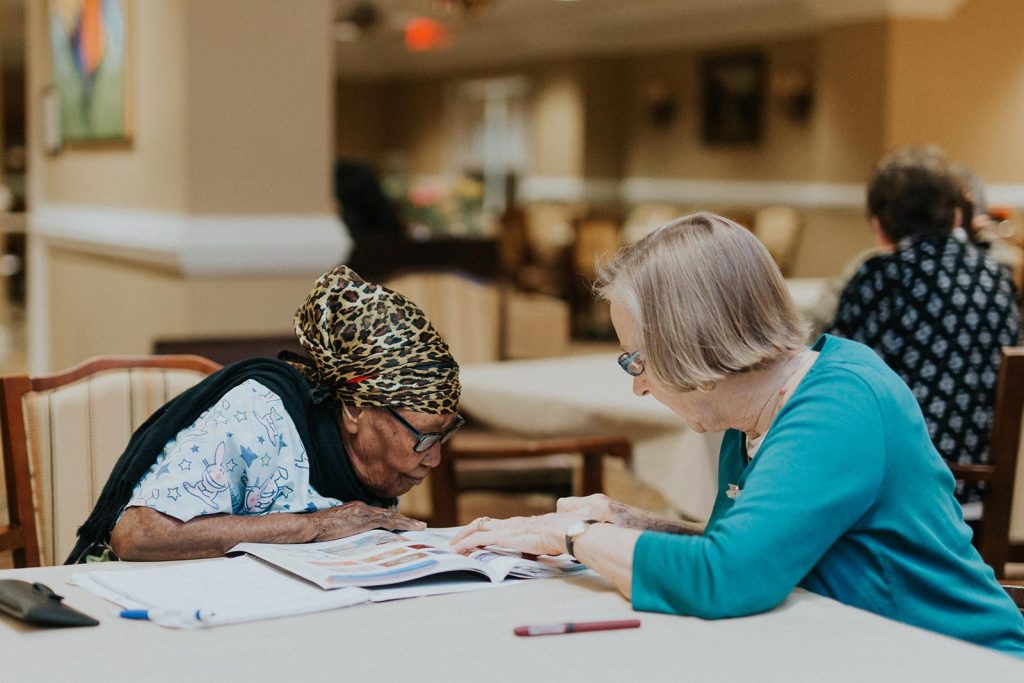
Julia and World Relief did find a way to bring refugees to Trezevant, and it has been a big success for both the residents of Trezevant and the refugee clients. Julia shared, “[One of] the really big things we’ve learned through this ESL class for these folks, [be]cause these are older folks…is they stay home. They’re the ones who babysit, they’re the ones who don’t know enough English to get out, so they stay home until their children can take them to the grocery, so they are housebound. So this is an outing, something they’re doing without their family. They’re coming together, and they love that.” World Relief staff can affirm this. Even after the very first class, one of the ESL students, content and smiling, said, “Today was a good day. I’m not alone.” Their new friends benefit from intentional, individual tutoring and the opportunity to practice English, often 2:1 volunteers to clients. “One of our men is 83, and he’s from Baghdad, and he can write a sentence! So he’s moving on big time, and we’re all excited about him! He’s our most enthusiastic…It’s just amazing at 83 to be so eager to learn…They all are so sweet, so appreciative.”
Julia spoke about other benefits she has seen. “I would like to think they are seeing some Americans who are friendly, warm, and helpful. They are excited to get out and see some of the world without somebody to lean on. They have become very friendly with each other. I think, and I hope, they feel that they’re making some progress.”
And the volunteers? “What we get out of it is immeasurable. It’s just a joy to live here and think that you’re doing something that is maybe beneficial to somebody else. You can get very isolated and self-centered here, and even happy, but not be contributing at all. And these people love what they’re doing.”
“Every time I visit the class at Trezevant, I feel it is a sacred space, I can’t really describe it any other way. These two groups of people together give me a glimpse of the Kingdom on Earth as it is in Heaven,” described Karissa Pletta, World Relief’s resettlement specialist responsible for Elders services.
Of course, the Elders’ ESL class hasn’t been without its challenges. Julia shared that she had to be selective about which residents to invite to volunteer with tutoring because of an experience with someone who vocalized not wanting to welcome refugees. “You know, when you’re only with people who are fearful, it’s really hard not to take on some of their fears,” Julia said. She also told us about her desire for this class to be more relational than transactional: “We don’t want it to be like, ‘We are the ones giving to you poor creatures!’ But instead, we are friends working together. And I think we’ve instilled that atmosphere.”
Their friendship was strengthened on a recent field trip to the Brooks Museum of Art in Memphis. Aware of their nationally touring exhibit, African-Print Fashion Now, the volunteer tutors suggested the joint visit for a tour and tea. The museum provided guided visits to historic portions of the museum as well as fabulous docent-led focus on the fabric exhibit. The afternoon fostered continued community building.
——————-
When scheduling a time to meet with Julia outside of the ESL class, she said, “Well, you can’t come at 9, that’s my water aerobics class. Be here at 10!” In a few hours together, hardly a single person, resident or worker, passed us by without offering a “Hello, Miss Allen! Good morning, Miss Allen! How are you doing today, Miss Julia?” Clearly, Miss Julia is not your average 92 year old, and when we sat down to talk, she wasted no time getting to the point. She had a story to tell, and she was ready to tell it.
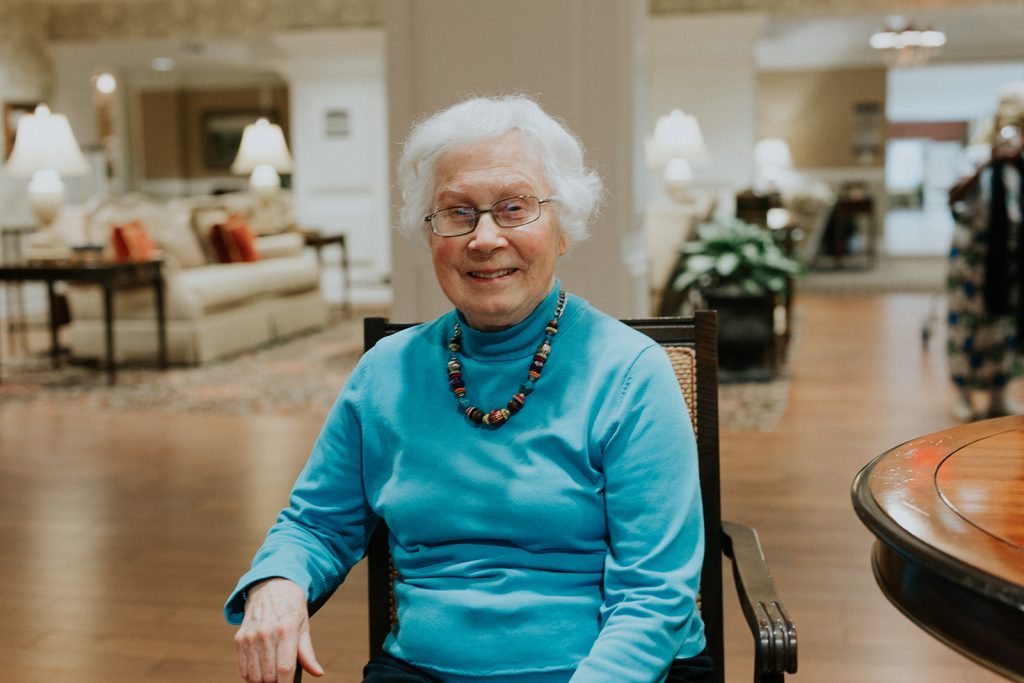
What inspired Miss Julia to go above and beyond in the way that she has for these refugees? In addition to being an active community member (“My children say, ‘Mother, you’re never in your room, we can’t ever get you on the telephone!’”), serving others has been a part of Miss Julia’s life for a long time. “I’ve done a lot of mission trips with my church. I thought I wanted to be a missionary until I met my husband. I’ve just always been drawn to serve in some way. When I was younger, I was very shy. When I was in college, it was during the war, they had a program at church asking volunteers to go into communities where they were short-handed, and they just didn’t have enough people to do things. So I went to Mobile, Alabama, that summer. That was the first time I really just reached out. I think it was a formative time for me because I got over being shy. And then, I just went from there, because I wasn’t happy if I wasn’t doing something that I felt was helping. But you know the receivers are yourself. I, too, was finding out that this means far more to me than it could possibly mean to a refugee. And that’s what brotherhood and service and all those things, that’s what that means.”
Once Miss Julia knew there was something she could do to help refugees integrate more successfully, her empathy moved her to action: “You start thinking about what would I do if I had to leave everything I own, even the members of my family, and leave, run away for safety, and go through the ordeal of the refugee camp, and wait, wait, wait? And then come to a place that is so entirely different from their experience, not knowing anybody, not knowing the language, running into all different ways of doing things. I just thought, what would I do if I had to go to Congo and learn Swahili?”
Miss Julia offered advice for anyone who is hesitant to get out of their comfort zone and come alongside refugees as they rebuild their lives in America: “We’re so aware of refugees in Memphis now in a way that we were not before. There is a desire to do what we can. I just have to believe that you’re gonna find some more people that would like to do this. And you have to have faith. Even [if you think], ‘I’ve never done this, and I don’t know if I can.’ You can! And the only way to find out if you can is if you do it.”
Miss Julia, thank you for inspiring us with your example. You model Love In Action.
By Noah Rinehart, Intern, World Relief Memphis
Photos by Emily J Frazier/Emily Frazier Creative for World Relief Memphis
Marianna’s Story: From hardship to happiness
Intern Stephen Sneed shares the powerful story of Marianna*, part of our #ThankGodForWomen series. We are grateful for her willingness to share, and hope that by telling it, we increase awareness of global hurdles that prevent many women and girls from living out the full potential God has placed within them. (*Names have been changed)
A native Filipino and wife of an Iraqi refugee, Marianna’s journey to Memphis is unique. Sacrificing her beloved childhood island home and dreams instead for steady employment that would financially provide for her parents and brothers, Marianna would work for many years before finding love and starting a family, only to be caught in the crosshairs of an immigration nightmare before finally finding happiness and freedom in the United States.
Originally from a small island and fishing community in the Philippines, Marianna is the fifth of eight children, but the only daughter. She recalls having a strong support system at home and speaks fondly of her parents and brothers as she describes early memories. She recalls her life in the Philippines as good, but very hard because of the lack of resources and job opportunities. Her mother was a street vendor, selling fish and crustaceans in order to buy the family’s food, which mainly consisted of rice. Her father, a farmer, struggled during many seasons of Marianna’s childhood when crops would refuse to grow.
Hard work, frugality, and education were valued by Marianna’s parents. Through careful savings over years of hard labor, they were able to send a couple of her older brothers to college. But by her high school graduation, no money was left, and she had to find a way to support herself and help her family. Opportunities as a domestic worker enticed her to contracts in Manila and eventually Cyprus. She would be responsible for cleaning, cooking, and acting as a full-time nanny for more prominent families.
Working and saving for four years in Manila followed by five years in Cyprus, the days were long yet her work ethic was unwavering. Upon each paycheck, Marianna would send the money she could spare back to her family. When informed of her younger brother’s college aspirations, she pushed aside hopes for her own education and continued to sacrificially send support. Due to her tireless efforts and his diligent studying, he graduated with a degree in electrical engineering. Extremely proud of him, Marianna is filled with gratitude when considering her role in helping him.
Away from her family and home for almost a decade, Marianna’s mother encouraged her to return home at the end of her contract. She enjoyed a restful reunion with her family for a couple of months before assessing the continued lack of employment opportunities at home, so she sought work abroad again. Through a connection with a relative in Lebanon, Marianna was granted documents for a domestic worker role similar to her jobs in Cyprus and Manila. She lived and worked with an employer family and transitioned well. However, at the end of her two year term, government regulations had changed: she could not renew her contract, nor had she earned enough money to return home.
A fellow Filipino woman compassionately provide Marianna with work at a Lebanese nail salon. This woman was more than just an employer to her, but a friend who fostered community: someone she considered to be family. During this new-found season of stability, Marianna met a man named Abdul* through the connection of a mutual friend. He was an Iraqi refugee who had fled Saddam Hussein’s army and escaped by foot to Syria. There he was granted refugee status with the UNHCR (United Nations Commissioner for Refugees) and temporarily resettled in Lebanon. What began as a slow friendship, visiting once a week for two years, allowed them to truly get to know one another and lead into their biggest adventure either had ever been a part of: marriage.
With love in her eyes, Marianna joyfully described her wedding day. She smiled as she spoke of her husband and what a good man he was. However, because they were both so far from home on their big day, Marianna and Abdul were the only ones in attendance. Rainy and cold that afternoon, Marianna nevertheless saw it as a blessing and she still dreams of her walk down the aisle in her white dress.
In 2015, two years after she married Abdul, Marianna gave birth to their son, David*. But tears welled up in Marianna’s eyes as she pressed forward in our conversation to describe a series of events full of trial and great difficulty.
During the years Marianna worked at the nail salon, the Lebanese government required differing detailed worker permits and documentation dependent upon the type of immigrant or refugee employment. Marianna’s status and documentation as the wife of a refugee was what she thought she needed in order to continue working in the salon. However, only five months after David was born, men from Lebanon’s Immigration Services arrived at the nail salon and informed her that her permit was not valid. Arrested and taken to jail, Marianna’s infant son was left behind in his crib at the shop.
She recounted her imprisonment through tears. Small and overcrowded, it offered no sunlight or fresh air due to its location under a bridge. Many of her fellow inmates were guilty of serious offenses. Marianna struggled to understand why she had been taken there. She desperately needed to be with her baby and above all, feared the possibility of being deported to the Philippines without her son and husband. She cried and prayed to God to reunite her with her family.
After 15 days, a representative from the UNHCR negotiated her release. Her prayers were answered: she was joyfully reunited with her family and returned to work with the proper paperwork. But soon Marianna learned that her father had fallen ill back in the Philippines. She needed her passport in order to visit him, but it had been confiscated when she was arrested! Marianna was advised that in order to retrieve her passport she would have to sign for it in person. Complying, she nervously returned, but instead of receiving her passport, prison authorities detained her again, this time with no reason or explanation. She suffered in prison another 15 days before the UNHCR could intervene. Tragically, her father passed away while she was detained and she missed his funeral. She felt as though her whole world had been flipped upside down. Relieved to be with her son and husband, she realized Lebanon was no longer the safe haven needed to raise a child and build a future. Abdul and Marianna urgently pursued permanent refugee resettlement.
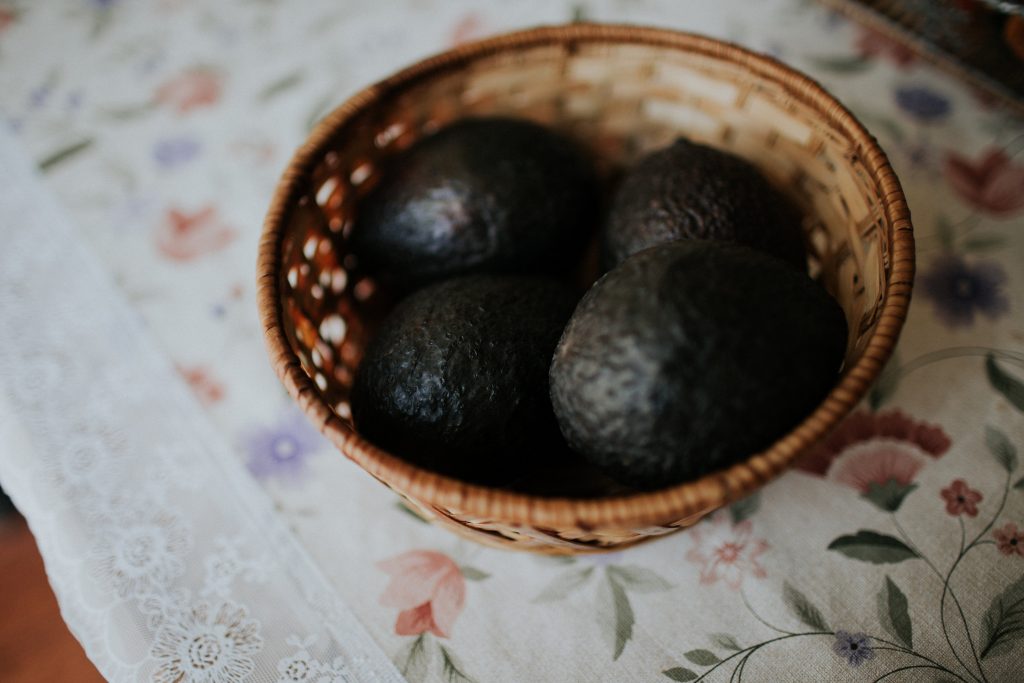
In January 2017, Marianna, Abdul and David received the joyful news that they were finally granted permanent resettlement to the United States. World Relief Memphis greeted them with love and support for their early months of transition to their new home and new culture. During that same time, we paired them with a Good Neighbor Team, a small group of caring volunteers to walk alongside them in friendship and support. Together with World Relief, their Volunteers, and such a welcoming city, they are happy, healthy, and finally moving forward as a family.
Some milestones to celebrate in their first year in Memphis include Abdul’s job at a Memphis factory. He takes a few minutes of his lunch break to FaceTime with Marianna and David. Marianna passed her driver’s test after practicing daily with a new local Filipino friend. David is happy, healthy, and hungry to learn. English is spoken in their home, and he has learned his ABCs, counting to ten, and is quick to tell you what sound a horse makes. Seeing Marianna with David as he sleepily walks around their apartment in his Sponge Bob pajamas, it is incredibly touching to observe how devoted and caring a mother she is after having served so many other families as a nanny, and sending her money back to the Philippines to help her family survive. Now home with her own son, she provides David with encouragement and the deepest love. American flags and red, white and blue decorations grace their hospitable first American apartment, where tasty recipes are shared and delicious food is served to visitors. Marianna, content after so many years of hardship and fear, beams with joy. Now that she, Abdul, and David are settled in the U.S., they are happy…and they are free.
– by Stephen Sneed
After reading Marianna’s story, can you identify the global giants she had to overcome? Some common obstacles for women and girls around the world include gender inequality, access to education, employment opportunities, and harmful belief systems – resulting in social, emotional, physical, and spiritual poverty.
Additionally, 22.5 million people have official refugee status due to persecution and conflict like Abdul. Less than 1% are approved for permanent resettlement in the U.S. and other countries.
Be part of welcoming them – and transforming communities at home and around the world. If you would like to learn more about Good Neighbor Teams or other ways to come alongside our refugee and immigrant community, please visit worldrelief.org/memphis/get-involved/volunteer.
3 Ways to Meet Transportation Needs in Memphis
If you’ve been involved with refugees in Memphis, you already know that transportation is one of the greatest challenges facing these new Memphians. The WRM team has seen first hand how successfully refugees overcome this challenge and found these two articles interesting when considering difficulties with transportation.
In an article entitled The 7 biggest challenges facing refugees and immigrants in the US, Christina Nuñez, editor of Global Citizen, states that the lack of access to reliable transportation can affect nearly every aspect of a newly arrived refugee’s life. She describes how limited English proficiency and literacy can delay obtaining a driver’s license. The article also mentions that once a family does have one car, this still does not always meet all the needs for transportation. For example, children may need to go to school and adults may need to go to work or run errands at the same time.
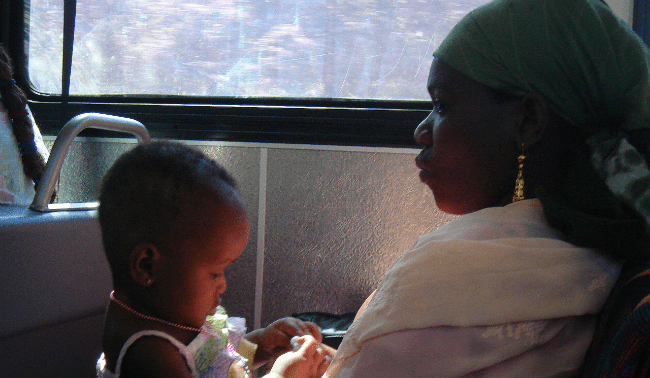
In the March 2016 issue of The Atlantic, James Fallows further illuminates transportation challenges in How America Is Putting Itself Back Together. Fallows acknowledges the economic contribution of refugees and immigrants to smaller cities and towns while pointing out the difficulties created by inadequate transportation. In the article Fallows notes that unreliable public transportation is a significant challenge faced by refugees, who sometimes solve these problems by walking long distances to and from work, even in inclement weather. Fallows also tells that cultural norms regarding transportation can be challenging.
In Memphis, you can help new refugees overcome their transportation challenges in 3 ways.
- Driver’s Education Classes: Donate $500 to pay for a refugee to attend class and receive private driving lessons. Students also have the opportunity to take driver’s license testing.
- ESL Volunteers: Volunteer to help a refugee become fluent and literate in English so they can pass the driving exam.
- Used Cars: Donate a working used car or money towards the purchase of a first car.
Acting on any of these steps will help refugees assimilate to life in Memphis and move towards self-sufficiency.
Syrian refugees find new hope in Memphis
So far 19 Syrians have taken refuge in Memphis, and Mahmoud Al Hazaz is just one. He left his home country of Syria behind and took his family to Jordan after the government shelled his successful restaurant. But life is rarely easy for a refugee. Mahmoud has now found safety in the Bluff City for his wife and four children and is hopeful the rest of his family can join him here soon.
This isn’t a story of pain, even though it could be. It’s a story of hope that rises out of pain, and that’s probably the most genuine kind.
Imagine owning a successful restaurant, one that is profitable and full of customers, the kind you see time and again across Memphis. Mahmoud Al Hazaz’s street-level restaurant in Homs, Syria, drew big crowds, bringing him success and a good life.
But in the early days of what has turned into a crippling civil war, big crowds came to represent dissension to the Syrian government. In early 2011, when the Syrian regime came across large crowds they countered with AK47s, tanks and other weapons.
It was during this time that Mahmoud’s busy restaurant was hit with a tank shell. Thankfully when diners saw troops coming, they all went inside and no one died.
Think about that for just a moment. No one died. At a restaurant. Talk about finding the good in a bad situation.
“In the beginning of the events they started with peaceful demonstrations,” Mahmoud says through an interpreter. “Then the Syrian regime came with weapons. When they would see a big group of people they’d shoot at them. We had a crowd of people at the restaurant and the government hit it.”
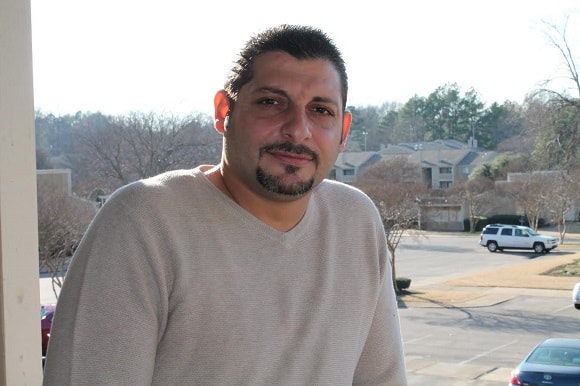
Mahmoud tells this story as he sits in the living room of the Memphis apartment he has called home since early December. There is no emotion in his eyes as he retells his story in a matter-of-fact tone. Maybe it’s the passage of time – it has been more than four years, after all – or maybe the fact no one died in this attack. Either way, Mahmoud seems grateful.
There is something different about Mahmoud. By all accounts, he is an excellent chef, with the ability to make fantastic versions of traditional Syrian specialties. But on this mild and sunny January afternoon in Memphis, Mahmoud isn’t talking about food. Not yet, anyway.
His restaurant was destroyed by his government. He and his business partner responded by reopening it in a taller building so it wouldn’t be in the line of fire. But Mahmoud also decided it might be safer if he stayed with a friend instead of in his own home.
The fighting eventually followed. The free Syrian army and Syrian government forces had firefights around his restaurant.
It’s estimated that since the Syrian civil war began in early 2011, a quarter of a million people have died. Mahmoud’s father was one of them. Mahmoud didn’t share how, only that a bullet did the job. No emotion, just a bullet.
Mahmoud left his successful restaurant of five years behind and took his family to Jordan. It was still pretty easy to leave Syria in November 2011. In those days a passport was enough.
It also helped that at the border crossing, no charges against Mahmoud or his brothers were found. So they were allowed to cross, ultimately settling in the capital city of Amman.
When he and his family first arrived, conditions were good. They were welcomed, and Mahmoud and his family began to resume life in a new home. But life is rarely easy for a refugee.
“In the beginning, Jordanians were welcoming,” Mahmoud said. “Their treatment was good, but then as more and more came and it got crowded, the way we were treated was difficult.”
Mahmoud said rents were raised, but because of his restaurant experience, this successful chef had no problem finding work, especially in the beginning. Also, living conditions weren’t bad, especially compared to Syria. Mahmoud’s extended family of 10 shared a four-bedroom apartment.
But then more Syrians followed and with them more difficulties. In his first year in Jordan, Mahmoud didn’t need special permission to find work. Later, though, the country began requiring refugees to acquire permission papers to gain employment, which meant it cost about $700 a year just to get a job.
In Memphis, Mahmoud hopes to gain permission to work soon. His traditional Syrian food is really good, he said. It’s hard not to take this man’s word for it. He’d love to find a restaurant that could use his services, or maybe a restaurant owner or investors willing to take a chance on a man who’s already taken a chance on life and won.
“All my experience has been with Arabic food, so that’s what I’m comfortable with. But I can learn anything,” he said. “I can do Western food.”
In broken English, he said “KFC,” with a smile.
Mahmoud has found safety in Memphis for his wife and four children. But his mother and brother, as well as his brother’s wife and child, are still in Jordan. Mahmoud said the family is hopeful to hear soon they can come to the United States.
Maybe you’ve heard their story. Mahmoud’s mother was interviewed by the website Humans of New York in early December. “Tomorrow he’s leaving for a place called Memphis, Tennessee,” she told the site. “I don’t know what I will do without him. I hope they will let me come to Memphis too. Can you tell us anything about Memphis? Are there nice people there? I heard that it is a city of music. I love music.”
Mahmoud is hopeful his family can join him here. He also has a brother still living in Syria, and two others living in Germany and Brazil, respectively.
Memphis is a different world than Syria. For one thing, Homs is a battleground.
“I didn’t know anything about Memphis,” Mahmoud said. “I knew California and Texas. It’s very nice here. The people have been excellent. Their treatment of us has been very good. I’m not just saying this for your sake. When I talk to my family they ask, ‘How is the treatment of Americans,’ and I say it’s wonderful.”
Mahmoud said his children were afraid at first because they were around new people, and because they didn’t know the language. They’re adjusting, though, particularly the girls – ages 10, 8 and 5 – who are all in school. The boy is 2 1/2, and like most toddlers, his attention is on the phone in his hands instead of the American reporter in his living room.
Mahmoud said his life was wonderful in Syria, but that was before the civil war. There is no going back for him, ever.
“Syria’s finished,” he said with a smile. “As far as I’m concerned Syria’s finished.”
He did admit that he’d like to one day live in his home again, but he knows better.
“There’s nothing to go back to,” he said. “The old city is demolished, complete destruction. There is no going back.”
Not to their house, at any rate. When they left Syria, Mahmoud and his family left a home fully furnished. Afterward, they heard everything was stolen, even the toilets, electrical fixtures, and light bulbs. It’s since been destroyed, presumably by an artillery shell.
And of course, Mahmoud’s story isn’t unique.
More than 800,000 Syrian refugees sought asylum in Europe between April 2011 and November 2015, according to the United Nations. That’s enough people to fill 12 soccer fields, standing very tightly.
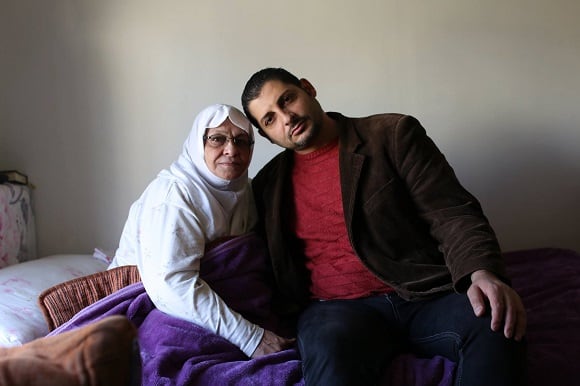
Additionally, the UN has registered more than 4 million Syrian refugees in Turkey, Lebanon, Jordan, Iraq, Egypt and North Africa, most of them living in camps close to the border. For these refugees, it would take 62 soccer fields.
So far 19 Syrians have taken refuge in Memphis. Nearly 55 soccer fields fit in one square mile, and Memphis is over 300 square miles in size. That’s enough room for considerably more than 19 Syrians.
Steve Moses is the office director for World Relief Memphis, an organization that brings about 200 refugees a year to the area. He recently was in the Middle East, a region he’s spent a lot of time in over the years. He gets emotional recalling a 5-year-old girl he met.
“She cuts herself, breaks glass in her hand, takes cold showers yet shows no emotion,” he said. “Her uncle sits incapacitated and in a deep depression.”
But the most important part of the work he does, Moses said, is to deliver the message he’s been told to bring back to America, time and again.
“All – yes, all – of them stated they are human,” he said. “Real people … they desire for dignity and respect. (They want) their personal stories to be known and not simply lumped together as a large group of people.”
By Lance Wiedower in the High Ground News on Thursday, January 21, 2016. The original article can be found here.






